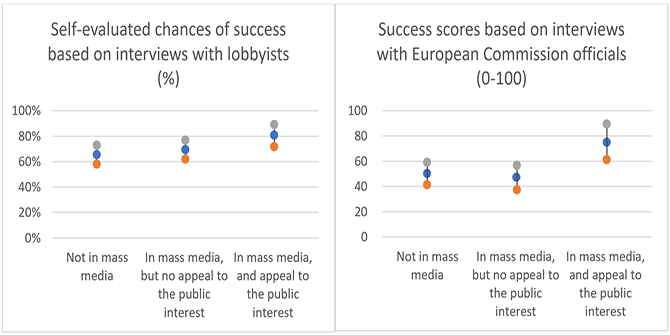 Lucas Núñez investigates the impact of campaigning efforts on parties’ electoral performance during last three general elections. He finds that local campaigning in particular increases a party’s vote share by about three percentage points.
Lucas Núñez investigates the impact of campaigning efforts on parties’ electoral performance during last three general elections. He finds that local campaigning in particular increases a party’s vote share by about three percentage points.
During every election campaign, political parties apply their resources to mobilise voters to turn out and support them. Campaigns involve a wide variety of strategies and tactics. Some operate at the mass level, typically through national media; others operate at a lower level: contacting voters directly through in-person canvassing efforts, targeted mail, or telephone calls. But to what extent does this kind of local campaigning influence a party’s electoral performance? My recent research shows that despite increasingly nationalised campaigns, parties in Great Britain still derive important electoral benefits from conducting local campaigns.
Measuring the impact of local campaigning is difficult. At the core of this challenge is the fact that parties do not contact voters at random. Rather, parties are strategic in their behaviour: in addition to focusing on a specific group of constituencies, parties aim to contact those voters they believe will be more open to their messages and appeal. These types of voters, however, are typically already likely to support the party. Thus, to correctly measure the impact of local campaigning it is paramount to distinguish between the electoral impact that a party’s local campaigning may have, from the fact that parties will tend to contact already likely supporters. This, in turn, poses a difficult challenge for researchers, since we rarely possess sufficient (or sufficiently detailed) information about parties’ decisions to pursue some voters but not others.
To address this challenge, I use data from the British Election Study online panel, which interviewed the same voters multiple times (waves) prior to each general election in 2015, 2017, and 2019. The multiple waves are the key to disentangling the impact of local campaigning from the strategic behaviour of parties. This proceeds in two steps. First, interviews conducted during the early waves for each election allow for the estimation of a probability that any one voter is being targeted by a party, which is, in a sense, a measure of the party’s strategic intent. Once this measure of a party’s intent to contact a voter is obtained, it is used to account for the party’s strategic behaviour during the final wave of interviews in each election, which covers parties and voters’ behaviour in the final (and arguably most intense) weeks of campaigning.
Overall, my results show that parties’ local campaigning efforts were effective at increasing their support during the 2015, 2017, and 2019 elections. Conservatives’ local campaigning increased the chances of a voter choosing the Party by between 5% and 7%, among the voters targeted. For Labour, these efforts led to a 4.3% to 7.4% higher chance of supporting the party. The additional support for the two major parties comes partly at the expense of third parties and partly from increased mobilisation of otherwise abstaining voters, with virtually no evidence that the major parties pick-off voters from one another. Local campaigning efforts by third parties also increased the chances of a voter supporting them by between 8.6% and 9.4% among targeted voters, making third parties more effective than the major ones. This additional support generally comes at the expense of the two major parties, with little evidence of mobilisation of abstainers by third parties.
The overall impact of local campaigning, however, depends not only on how effective parties are at swaying the voters they targeted, but also on the overall intensity of those efforts. To obtain a measure of the overall impact of local campaigning, I compare actual election results to the counterfactual support that parties would have obtained had one of them not conducted any local campaigning whatsoever. The results from this exercise for England show that the Conservative Party’s vote share would have been 3.9% lower in 2015, 1.8% lower in 2017, and 2.2% lower in 2019. For Labour, a similar pattern emerges, although with slightly larger values: losses of 4.9%, 2.2%, and 3.1% for 2015, 2017, and 2019, respectively. Third parties (collectively) would have seen their vote share reduced by 4%, 3.2%, and 3.8%, respectively. Analyses for Wales and Scotland show similar patterns, although the losses for the Scottish National Party would have been somewhat larger: 3.9%, 5%, and 5.4% in 2015, 2017, and 2019, respectively.
In addition to providing with a measure of the impact of local campaigns, this research also speaks to the importance of accounting for the strategic behaviour of parties (and potentially other actors) in any analysis of electoral performance and tactics. In the case of local campaigning, ignoring this strategic behaviour can lead to gross overestimation of the benefits of local campaigning; sometimes double that of the actual electoral gains.
My research, therefore, shows that local campaigning and direct appeals to voters remain a relevant force in elections: by relying on a variety of direct forms of voter outreach, parties in Great Britain are capable of making substantial gains in electoral support through a combination of voter conversion and mobilisation. While local campaigning is certainly not the only factor influencing election outcomes, parties that ignore it will only do so at their own peril.
____________________
Note: the above draws on the author’s published work in Electoral Studies.
 Lucas Núñez is an Assistant Professor of Political Science at the Schar School of Policy and Government at George Mason University.
Lucas Núñez is an Assistant Professor of Political Science at the Schar School of Policy and Government at George Mason University.
Photo by Glen Carrie on Unsplash.






